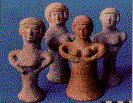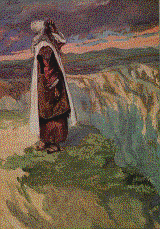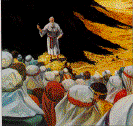The Torah: Deuteronomy: God’s People Challenged
Outline of Deuteronomy
- Introduction (1:1-5)
- Historical prologue (1:6–4:43)
- Stipulations (4:44–26:19)
- Blessings and curses (27:1–30:20)
- Succession arrangements and public readings (31:1–34:12)
The outline of the book follows a pattern used for international treaties in the region, which contained five main sections.
Introduction: chapter 1:1-5
Deuteronomy records Moses’ farewell address to Israel on the plains of Moab. Moses rehearsed God’s law to the new generation of Israelites to prepare them for life in the Promised Land, which they were about to enter. We are reminded that the Israelites spent 40 years on a journey that should have lasted 11 days (verse 2). “The journey from Jebel Musa (traditional site of Mt Sinai/Horeb)…to Kadesh [an oasis on the border of Canaan]…has recently been shown to take just this time” (Eerdmans’ Handbook to the Bible, p. 195).
From Sinai to Kadesh: chapter 1:6-46
Moses reminded the people why God had condemned them to 40 years of wandering in the wilderness. He highlighted the story of the scouts and Israel’s lack of faith (verses 19-46). [See commentary on Numbers 13–14.]
Edom, Moab and Ammon: chapter 2
In this chapter, we learn about God’s concern in protecting national rights (verses 2-19), God’s insistence on obedience (verses 2-37), God’s care for his people (verse 7) and God’s blessing and protection (verses 7, 25, 33).
The generosity shown to the Edomites (descendants of Esau), Moabites and Ammonites (descendants of Lot — Genesis 19:36-38), because of kinship, was typical of patriarchal times. God gave specific lands to these peoples (Deuteronomy 2:4-5, 9, 19). Israel was to respect these God-given territorial boundaries (verses 26-37).
War against Og: chapter 3
Og’s territory was part of the Amorite kingdom. Bashan, famous for its cattle, was an inviting destination for the tribes of Reuben, Gad and Manasseh. [See Numbers 32.]
A call to obedience: chapter 4:1-43
Moses reminded Israel of the blessings that result from obeying God: “The Lord is God in heaven above and on the earth below. There is no other. Keep his decrees and commands, which I am giving you today, so that it may go well with you and your children after you and that you may live long in the land the Lord your God gives you for all time” (verses 39-40).
Moses also designated three cities on the east side of the Jordan River as cities of refuge. These protected a suspected murderer from the law of blood revenge. [See Numbers 35.]
Spiritual Lessons |
|
Stipulations of the Covenant: Deuteronomy 4:44–26:19
Rehearsal of the Law: chapters 4:44-5:33
Moses reviewed the Ten Commandments (Exodus 20:1-17). These express the Israelites’ duties to God and neighbor. Together with the “judgments” governing the daily life of Israel (Exodus 20:22–24:18), and the “ordinances” regulating Israel’s worship of God (Exodus 25:1–31:18), they formed “the Law” (Matthew 5:17-18), or Mosaic Covenant.
The Great Law: chapter 6
Verse 4 begins one of the most significant passages for orthodox Jews, who call it the shema’, after the first word, “Hear.” Jews have carried out verses 6-9 literally, writing these words on parchment and binding them in little boxes on their foreheads and hands. These boxes were later called phylacteries (Matthew 23:5; see also Josephus’ Antiquities of the Jews, book 4, Chapter 8, section 13).
This command, however, was not intended to be a ritual requirement, but a vital spiritual reality in the life of every believer. Jesus summed up the whole law in the words of Deuteronomy 6:5: “Love the Lord your God with all your heart [or mind] and with all your soul and with all your strength” (Matthew 22:37-40).
In this important chapter, God spoke about Israel’s new life in the Promised Land.
|
Israel’s New Life |
|
Moses explained the rationale behind these guidelines: “The Lord commanded us to obey all these decrees and to fear the Lord our God, so that we might always prosper and be kept alive, as is the case today” (verse 24).
Moses’ warning: chapters 7-10
Moses now turned to the task at hand. The Israelites would soon be living near Canaanite tribes, and they had to take extra care to obey God, separating themselves from sin. The idolatrous Canaanites were to be exterminated because their wicked ways would corrupt the Israelites. The Ugaritic religious texts, discovered between 1929-37 at Ras Shamra (ancient Ugarit) on the coast of northern Syria, confirm the depraved religious practices of the Canaanites around 1400 B.C.
Moses predicted that God would give the Israelites victory and prosperity in their new homeland (Deuteronomy 8:7; 9:3). But such blessings would bring dangers. Israel could become proud and be tempted to forget God, not giving him the credit for the success achieved with his help (Deuteronomy 8:10-20; 9:1-29).
|
|
| “In the fortieth year, on the first day of the eleventh month, Moses proclaimed to the Israelites all that the Lord had commanded him concerning them” (Deuteronomy 1:3). |
In an effort to prevent this, Moses encouraged the Israelites to remember their past:
- “Remember well what the Lord your God did to Pharaoh and to all Egypt” (7:18).
- “Remember how the Lord your God led you all the way in the desert these forty years, to humble you and to test you in order to know what was in your heart, whether or not you would keep his commands” (8:2).
- “Be careful that you do not forget the Lord your God, failing to observe his commands, his laws and his decrees that I am giving you this day” (8:11).
- “Remember this and never forget how you provoked the Lord your God to anger in the desert. From the day you left Egypt until you arrived here, you have been rebellious against the Lord” (9:7).
Israel was supposed to remember God’s love in order to remain humble and faithful as his chosen people (Deuteronomy 10).
Love and obey God: chapter 11
“Obedience,” a key word in Deuteronomy, is further explained. Israel’s supreme duty was to love God and to show that love by keeping the law (verses 1, 13-14).
Canaanite idols to be destroyed: chapter 12
God commanded Israel to destroy all Canaanite centers of idolatry. Israel was not to use them for worship. God told the Israelites: “You are to seek the place the Lord your God will choose…to put his Name…. To that place you must go” (verse 5; see also verses 15-32).
God also gave commands concerning tithes, offerings and diet. Meat had not been part of Israel’s daily diet in the wilderness, but would be plentiful in Canaan. However, God cautioned them: “But be sure you do not eat the blood, because the blood is the life, and you must not eat the life with the meat” (verse 23).
False prophets: Chapter 13
 |
| Clay figures such as these have been found all over the Holy Land. They depict naked goddesses of fertility, such as the Ashtoreths, which are frequently mentioned in the Old Testament (Judges 2:13; 10:6; 1 Samuel 7:3-4; 12:10). The fact that they occur in such numbers, in those archaeological layers dating from Israelite times, confirms God’s warnings about the danger of idolatry spreading through the entire nation of Israel. |
False prophets were to be punished by death because they would lead the people into idolatry and apostasy. If an entire city defected to idolatry, it had to be destroyed (verses 12-16). False prophets are not a thing of the past (Matthew 24:24; 2 Thessalonians 2:9).
Separation of God’s people: chapter 14
Israel was a holy nation. Moses told them: “You are a people holy to the Lord your God. Out of all the peoples on the face of the earth, the Lord has chosen you to be his treasured possession” (verse 2; Exodus 19:5-6). Indeed, God called Israel his firstborn son (Exodus 4:22).
To maintain this close relationship with God, the Israelites had to separate themselves from the sinful customs of the heathen nations around them. For example, pagan mourning customs involved self-mutilation and cutting hair as a token of a gift for the dead. (Compare Jeremiah 16:6 and 41:5 with Leviticus 21:5-6.)
This chapter also describes dietary guidelines God gave Israel (Deuteronomy 14:3-21). These instructions are followed by commands regarding a tithe to be used at the festival seasons, and a tithe to help widows and orphans.
The year of release: chapter 15
Every seventh year saw a remission of all debts (verses 1-3). Lenders were required to cancel the balance on all outstanding loans to fellow Israelites at year’s end. It was also a year of release for Hebrew servants who wanted freedom (verses 12-18).
Festival days: chapter 16
Three times each year all Israelite men were to appear before God at his chosen place of worship: the Feast of Unleavened Bread, the Feast of Weeks (Pentecost) and the Feast of Tabernacles. God reminded the people that, on these occasions, they were to give offerings proportionate to their blessings: “No man should appear before the Lord empty-handed: Each of you must bring a gift in proportion to the way the Lord your God has blessed you” (verses 16-17).
Civil government: chapter 17
Conviction for capital crimes was possible only on the testimony of two or more witnesses (verse 6). If a suspected idolater was convicted, the witnesses would have to throw the first stones (verse 7). The priests, who were Levites, formed the supreme tribunal that heard appeals in difficult cases.
God anticipated Israel’s desire to have a king like the nations around them. He warned of the excesses a monarchy might bring. These became a reality during the reign of Solomon, who failed to regard the Deuteronomic law (1 Kings 9–11).
The future prophet: chapter 18
God would raise up many prophets in subsequent centuries, but New Testament writers would see in this chapter a reference to the greatest prophet of all, Jesus Christ (John 1:19-45; Acts 3:22-23; 7:37).
Cities of refuge: chapter 19
The institution of cities of refuge is rehearsed. The avenger of blood (verses 4-7) was the dead person’s next of kin who was allowed to avenge the death. This was to prevent the development of blood feuds. [See commentary on Numbers 35.]
Rules for war: chapter 20
God exempted certain groups from military service: those who had built a house or planted a new vineyard (verses 5-6), the newly or soon-to-be married (verse 7) and the fainthearted (verse 8).
God’s orders to destroy all the Canaanites within the Promised Land (verses 16-17) may seem harsh today. But an opportunity to surrender was given to other nations (verse 10). These Canaanite nations practiced vile religious rituals such as temple prostitution and child sacrifice. They were a threat to the national survival of Israel.
Additionally, God had given these nations time to repent. God told Abraham that “the sin of the Amorites has not yet reached its full measure” (Genesis 15:16). The Amorites were one of the Canaanite nations to whom God had shown great patience and mercy. By the time of Moses, God had given them hundreds of years to repent.
Various laws: chapter 21
These particular laws reflect different aspects of ancient Israel’s legal code.
|
Legal Guidelines |
|
Rules for daily living: Chapter 22
This chapter contains rules that encouraged the Israelites to be responsible citizens in all aspects of life. Guidelines are given in five areas.
Civic Responsibility |
|
“The assembly of the Lord” (verse 1), or as Stephen described it, “the church [Greek ekklesia, meaning “assembly”] in the wilderness” (Acts 7:38, KJV), was to be separated from everyone and everything unclean (Deuteronomy 23:9-14). This would also be true spiritually for the New Testament church (2 Corinthians 6:14–7:1). As Christians, we are cleansed continually by the Word (Ephesians 5:26) to enjoy the fellowship and blessings of God.
Divorce: chapter 24
Divorce was not commanded by Moses, as the Pharisees claimed in their confrontation with Christ (Matthew 19:7). It was a concession God made because of the hardness, or stubbornness, of the Israelites’ hearts (Matthew 5:31-32; 19:8; 1 Corinthians 7:10-15).
The other regulations that constitute the rest of this chapter show that, even in exercising their personal rights, God’s people are to be thoughtful and considerate of others.
Further regulations: chapter 25
God instructed the Israelites in several other important areas.
|
Additional Legislation |
|
The firstfruits: chapter 26
The offering of firstfruits reminded Israel of how God had blessed them. When they arrived in the Promised Land, the people were to rehearse their historic journey — they were to retell the story of their small beginnings in Egypt, their growth into a great nation, and their quest to claim and conquer the land God had given to them. When reading this chapter, consider the history of your relationship with God. Have you taken the time to thank God for what he has done for you?
Conclusion of the Covenant: Deuteronomy 27–34
Ebal and Gerizim: chapters 27–28
This ceremony of blessing and cursing was to be performed on Mt. Ebal and Mt. Gerizim overlooking the city of Shechem. From Gerizim, six tribes were to proclaim blessings, whereas from Ebal, the other six tribes were to proclaim curses. The altar for burnt offerings on Mt. Ebal typified Christ redeeming his people from sin.
In these prophetic verses, we get a picture of Israel’s tragic future of sin and unbelief. As we noted in Leviticus 26, these blessings and curses can also be understood as laws of cause and effect.
Commitment to God: chapters 29-30
Moses called for a commitment, challenging Israel to honor the covenant they had made with God. He exhorted the nation to obey God.
For Christians today, the lesson is clear: The Bible can sit on your bookshelf gathering dust, or you can make it a vital part of your life. However, knowing God’s Word is not enough; you must also love and trust God. The Bible is not the main goal – it is to help us get to the goal of a relationship with God.
Moses’ farewell address: chapter 31
 |
| “Then Moses climbed Mount Nebo…. There the Lord showed him the whole land…. Then the Lord said to him, ‘This is the land I promised on oath to Abraham, Isaac and Jacob’” (Deuteronomy 34:1-4). |
Moses’ life had been a long one — 120 years. He now delivered a few final farewells, along with some counsel and warnings. The law was given to the Levites for safekeeping, and God appointed Joshua as Moses’ successor (verses 14, 23).
The Song of Moses: chapter 32:1-47
Moses again called the people to obedience. In this song, Moses reviewed the history of Israel. He reminded the people of their past mistakes and warned them of the consequences of repeating those mistakes. But the finale of Moses’ song was positive: To the tribes now poised to take the Promised Land, he offered the hope that comes only from trusting in God (verses 46-47).
Moses’ blessing and death: chapters 32:48-34:12
Moses blessed the nation from Mt. Nebo. He was called “the man of God,” the title of Psalm 90, another song of Moses. Like the patriarch Jacob (Genesis 49), Moses’ testament comprised blessings on each of the 12 tribes.
Although Moses could not enter the Promised Land (Numbers 20:12), God showed him its beauty from Mt. Nebo’s peak. God then let him die. The last chapter of Deuteronomy contains a fitting tribute to a great servant of God: “Since then, no prophet has arisen in Israel like Moses, whom the Lord knew face to face” (Deuteronomy 34:10).


